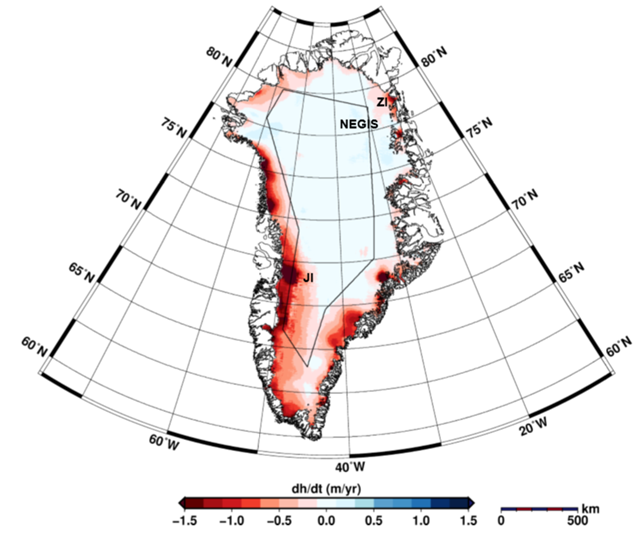Greenland ice loss doubles from late 2000s – Greenland and Antarctica together are losing 500 cubic kilometers of ice each year – ‘To us, that’s an incredible number’
By Jonathan Amos
20 August 2014 (BBC News) – A new assessment from Europe’s CryoSat spacecraft shows Greenland to be losing about 375 cu km of ice each year. Added to the discharges coming from Antarctica, it means Earth’s two big ice sheets are now dumping roughly 500 cu km of ice in the oceans annually. “The contribution of both ice sheets together to sea level rise has doubled since 2009,” said Angelika Humbert from Germany’s Alfred Wegener Institute. “To us, that’s an incredible number,” she told BBC News. In its report to The Cryosphere journal, the AWI team does not actually calculate a sea-level rise equivalent number, but if this volume is considered to be all ice (a small part will be snow) then the contribution is likely to be on the order of just over a millimetre per year. This is the latest study to use the precision altimetry data being gathered by the European Space Agency’s CryoSat platform. […] Significant thinning is seen also in the North East Greenland Ice Stream (NEGIS). “This has three outlet glaciers and one of these, the Zachariae Isstrom, has retreated quite a bit and some volume loss has already been reported. But we see now that this volume loss is really propagating to upper areas, much further into the interior of the ice sheet than has been recorded before,” explained Prof Humbert. In Antarctica, the annual volume loss is about 128 cu km per year (plus or minus 83 cu km per year). […] Prof Andy Shepherd, who was part of the British group that reported its findings in May, commented, “…the increased ice losses that have been detected are a worrying reminder that the polar ice sheets are still experiencing dramatic changes, and will inevitably raise concerns about future global sea-level rise,” the Leeds University researcher said. [more]
Greenland ice loss doubles from late 2000s
